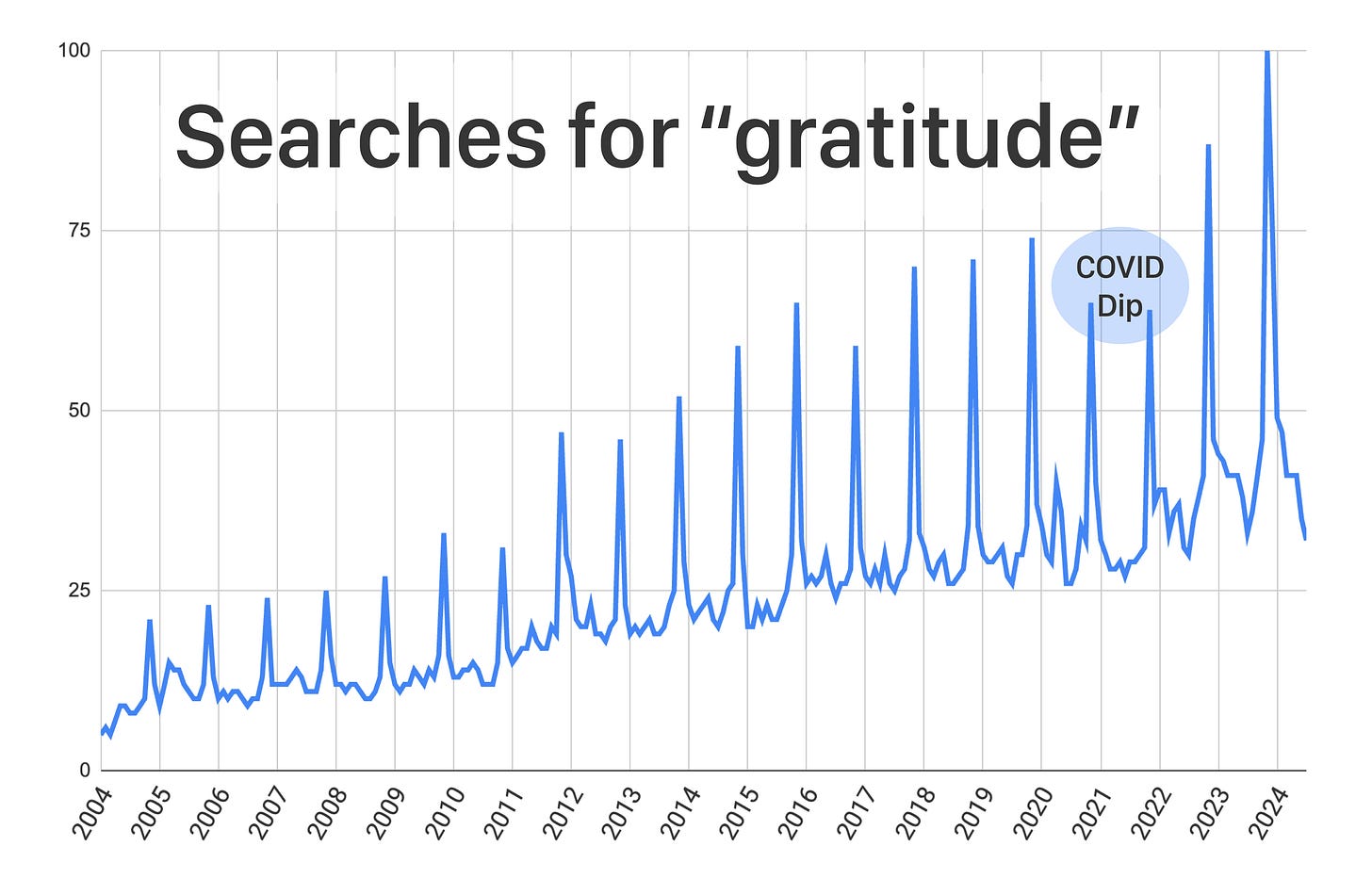How Being Grateful Helps You, More Than Anyone Else
A Perfectly Timed Natural Experiment Shows That Gratitude Builds Resilience
Welcome to Outsmart the Learning Curve! Fresh self-improvement ideas supported with accessible research. Subscribe to get a book chapter free.
I used to hate thanking people. As a kid my mother would nag me to send thank you notes or, God forbid, call relatives to thank them for a $10 birthday gift. The nine-year-old version of me thought the whole process was cringy and a complete waste of time. I clearly didn’t understand gratitude.
Of course, a “thank you” is meaningless unless true gratitude inspires it.
Today I feel real gratitude around my wonderful family, my health, and even truly thoughtful gifts.
But here’s a surprise: gratitude can make you more resilient.
Gratitude has been a part of the human condition since the beginning of time, but a quick look on trends.google.com shows the word has been consistently and continuously searched more frequently over the last twenty years, with spikes every November for Thanksgiving, and understandable dips in 2020 and 2021 likely due to COVID.
How Does Gratitude Make You Stronger?
COVID inadvertently created an amazing natural experiment to understand how gratitude affects people’s reactions to adversity. Researchers at the University of Nebraska asked over 200 college students to complete a standardized gratitude questionnaire assessing the subjects’ “appreciation of positive experiences in daily life.” The deadline to submit answers happened to be March 15, 2020. On March 16, COVID-19 restrictions were imposed on campus, so everyone in the study was simultaneously hit with an anxiety-provoking and confusing bump in the road.
The researchers repeated the gratitude questionnaire at the end of April 2020 when the news only continued to get worse, and the future was still quite unclear. The second survey included additional questions about how subjects were feeling about the COVID situation.
Surprisingly, the researchers found that those who scored higher on the gratitude scale on the first questionnaire were more resilient in their reaction to COVID-19. That is, they were more likely to report positive life changes due to the pandemic, including strengthened relationships, more free time, academic improvements, and better mental health indicators.
Conversely, those lower on the gratitude scale had a far more negative reaction to the pandemic including a higher preponderance of depressive symptoms, higher anxiety, and more negative outlooks.
The researchers discuss several theories about why those higher on the gratitude scale reacted so positively towards the COVID epidemic. The three concepts they describe include:
The broaden-and-build theory which proposes that gratitude, as a positive emotion, may broaden one's thinking and build lasting personal resources that can be drawn upon during difficult times.
The undoing hypothesis, which suggests that gratitude might counteract the effects of negative emotions.
The incompatibility theory, that gratitude may be incompatible with negative states like depression and anxiety, potentially displacing these harmful thought patterns.
These theories suggest that by practicing gratitude, you can build lasting mental resources that can help you navigate future challenges more effectively. Cultivating gratitude builds resilience.
Cultivating gratitude builds resilience.
How to Cultivate Gratitude
Like most healthy practices (e.g., eating right or exercising), you can’t just start being grateful “when you need it.” Gratitude is a practice like yoga or meditation where the benefits build over time. By practicing gratitude daily, being truly thankful for your life situation, you should be in a better position to respond well to the next looming crisis. While I found a range of methods for cultivating gratitude, everything from “gratitude journaling” to a “gratitude jar,” here are three that feel pretty natural that I actually do:
Express Gratitude While Walking Around. I walk pretty much everywhere and am lucky enough to be in beautiful cities or natural surroundings most of the time. I find myself consciously appreciating things like architecture, public art, or natural beauty and often take a moment to be grateful that I experience it.
Reflect on Challenges. Sometimes I ruminate on problems or challenges. When I catch myself in negative self-talk, I stop and reflect on what I have learned or could learn from these things. I only figured this one out in the last few years.
Sincerely Thank People. I’ve grown up quite a bit from that selfish nine-year-old and make a practice to authentically and sincerely thank people for everything from small acts of kindness to supportive phone calls to just being there for me.
How do you cultivate gratitude in your daily life?
Share your practices in the comments below—your idea might just help someone else build their resilience!










I'm grateful for your article! 😄
This is a beautiful and helpful piece! Thank you!